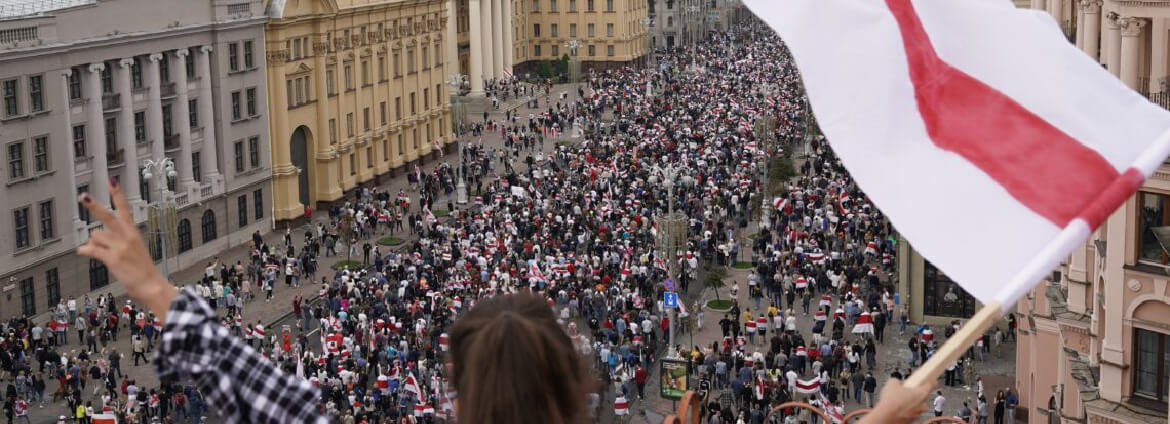Belarus is entering the seventh month of civil disobedience
Tomorrow marks six months since ongoing civil unrest started in Belarus. To attract public attention of global audiences, on February 7 a global day of solidarity with Belarus took place. At least 10,000 people joined solidarity events in 40 countries around the world.
Since August 2020, at least 32,957 people were detained on political grounds, according to Viasna human rights center. In January 2020 only, at least 873 civilians aged 13-72 were detained on political grounds. 475 of them were identified as males and 391 as females. At least 304 civilians were sent to jail as a result of detention. 227 people are acknowledged political prisoners.
After slightly a 100 pro-Russian activists urged the Lukashenka’s regime to ban Belarus national white-red-white flag used by peaceful protesters, 100,000+ people signed a petition against such measure. So far, this is the most popular public petition in independent history of Belarus. Later on, Belarusians launched another petition to add white-red-white flag as Unicode standard emoji for further use on all digital platforms, including Android and iOS. So far, there is no white-red-white emoji that Belarusians can use.
Last week, a former Prime Minister of Belarus, Siarhei Rumas (former CEO of Belagroprombank and ex-chairman of the board of Belarus Development Bank) went missing. His whereabouts yet remain unknown. Although his wife initially said she had no clue of where Rumas is, she later claimed via local media that her husband left the country to meet their children (who live in the UK and Italy).
UPD: In the afternoon (Minsk time) of Monday February 8 Rumas was reportedly answering phone calls from London, the UK, but refrained from any public comments on the reasons of his departure to Britain.
The disappearance of a former high-rank political figure is possibly connected to mass arrests of former and acting bankers, representatives of commercial structures and former state officials, including those related to state-owned Belagroprombank that Rumas long chaired.
As was suggested by a former member of Lukashenka’s team, political analyst and journalist Aliaksandr Fiaduta, self-declared ‘president’ sanctioned new arrests because he is unsure if civil and business elites, will continue publicly supporting him (unlike state security). Since bankers may express solidarity with still-popular candidate Viktar Babaryka, the executives in financial sector became the first targets of arrests. However, the alternative version connects relation of Rumas to corruption case related to financial favors he made helping his friend set up a business with budget funds.
Meanwhile, the representatives of the Investigative Committee (a law enforcement body yet publicly loyal to Lukashenka) announced that the civilians who were sentenced to fines for participating in political manifestations will be forced to pay the same fines again. Those people whose fines were earlier paid with the help of third-party solidarity organizations or individuals will have to pay the fine on their own, while the money that were previously paid by third parties will not be refunded to original payers – these money was arrested.
Politically-charged punishments imposed on civilians turned absolutely arbitrary, absurd (i.e. shop owners are being sent to jail for «picketing by placing goods for sale«) and go against the basic principles of legislation. Belarus legal system fails to protect civilians and thus has to be acknowledged as failed.
The court system operates in a repression-oriented fashion, and relevant commands are imposed upon judges by the presidential administration. Last week, BYPOL has published a document that exposes an address from the acting minister of interior Ivan Kubrakou to the Security Council of Belarus. In the document, the head of police force commands, in violation of Article 110 of Belarus constitution, for courts in Minsk region to impose arrest only on all civilians charged under Article 23.34 of the Criminal Code, and not fine them under any circumstances.
Article 23.34 is being used as a part of judicial conveyer to imprison civilians for participating in illegal gatherings – often, despite their participation in any public gatherings or under vague proofs of such activity.
Although the ministry of interior claimed the document fake, the ministry is clearly not acting in a good faith for at least 6 months and intentionally provides misleading information on all politically charged cases despite undoubtable evidence. In this particular case, upon the leaked letter was delivered to the Security Council, the rates of jail times against fines in Minsk region went up, as provided by our sources. While in jail, sentenced women are being held without access to any hygienic products, water, underwear, etc., and inmates continue to report inhuman treatment and denial of basic human rights.
Due to continuous worsening of repressions in Belarus, the Office of Sviatlana Tsikhanouskaya provided the EU with a list of 165 officials and businessmen who should be targeted by new EU sanctions. Meanwhile, Lithuania’s MEP Andrius Kubilius urged the EU to sanction over 250 individuals in a new expanded list. It has to be understood, however, that the nature of Lukashenka regime makes the introduction of sanctions against low- and medium-level law enforcement workers, judges, civil administrators, heads of state companies involved in repressions as well as their families more effective considering the context of political system and the way the ‘vertical of power’ is built in Belarus.
Last week, the first Belarusian citizens filed a criminal case under universal jurisdiction against Belarus law enforcement. 10 more cases are being prepared in Poland, 10 in Czech Republic, and 3 in Lithuania. The practice of universal jurisdiction use to prosecute human rights violators shall be widened since it plays crucial role in putting pressure on the representatives of the regime.
German liberal MEP and a vice-president of the European Parliament Nicola Beer called for the EU to sanction the judges employed by Lukashenka regime. Politically-motivated punishment of civilians conducted by Belarus courts is a fundamental element of repressive system and illegal prosecution. Certain judges are engaged in politically-charged cases and real-life judiciary processes have nothing to with national or international procedures and standards including competitiveness and presumption of innocence.
For instance, in Minsk at least 60 people were sentenced or fined on political grounds by only three judges in Minsk: Dzmitry Karsiuk, Maryia Yarokhina, and Maksim Trusevich. Systematic involvement of judges in repressions against civil population and violation of basic human rights should be treated internationally as complicity in crimes against humanity.
The EU and USA should consider judges and all state officials of Belarus involved in repressions not just as candidates for respective sanctions lists, but also as officials systematically engaged in violations of basic human rights and crimes against humanity – and thus as subject to universal criminal jurisdiction.
On February 3, Julie Fischer, appointed US Ambassador in Belarus, had a few meetings with Belarus leadership in Poland. Ambassador Fischer met Sviatlana Tsikhanouskaya, Pavel Latushka (a member of the Presidium of the Coordination Council and the head of the National Anti-Crisis Management) and other representatives of democratic forces. This step was warmly welcomed on the ground since Belarusians are getting very demotivated about any communications between foreign representatives and members of Lukashenka regime (including the MFA under Vladimir Makei).
On February 11-12, the so-called “All-Belarusian People’s Assembly” will take place in Minsk. Telegram channels call for mass protests on these dates. However, the turnout can be low due to unfavorable weather conditions that may cause difficulties in terms of public logistics and safety of protesters should they deploy to the city center of Minsk. The United States already acknowledged that the so-called “All-Belarusian People’s Assembly” is an “illegitimate conference”, not a politically-binding legal gathering as claimed by Lukashenka regime. Foreign diplomats are recommended to avoid this event and its delegates, and all foreign governments should consider including the participants of the so-called “All-Belarusian People’s Assembly” as candidates for sanctions lists and entry ban.
On the eve of this event, state-run ‘Federation of Trade Unions of Belarus’ claims to have collected over 1,000,000 signatures of workers against EU sanctions. The so-called ‘trade unions’ plan to send signatures to the International Labour Organization (ILO) where Republic of Belarus remains subject to investigations on the matter of forced labor in the last decade. Local media and independent Telegram channels reported numerous cases of workers being forced to sign a petition under a threat of dismissal or other forms of punishment.
‘Federation of Trade Unions of Belarus’ is not a trade union in its classical sense, but a part of propaganda and control machinery. The organization is used by the regime of Aliaksandr Lukashenka as his personal tool of control and forced mobilization of workers. As a rule, all workers of state enterprises are forced to join a local branch of ‘Federation of Trade Unions of Belarus’ and pay fees to the organization that supports Lukashenka in all political matters.
On February 3, three pro-Kremlin TV channels (112 Ukraine, NewsOne and ZIK ) were banned in Ukraine. For a long time, these media were engaged in whitewashing and promotion of Lukashenka’s positive image in Ukraine and broadcasted misinformation about peaceful protests in Belarus.
The formal owner of these channels, Taras Kozak, kept his savings in Belarus-based banks. Kozak is considered to be an intermediary of Ukrainian oligarch Viktor Medvedchuk – the most powerful pro-Kremlin figure in Kyiv. Vladimir Putin is known as the godfather of Medvedchuk’s daughter Daryna (born in 2004), and this relation pays off. Medvedchuk has close ties with Lukashenka family, and visited Lukashenka at least three times in 2019 as “Ukraine’s political figure” despite having any official status in Ukraine’s governance.
Finally, last week marked a scandal with Zimbabwe-based gold-mining company related to businessmen from Lukashenka’s circle. An incident reported in local media took place in November 2020. Then, a dozen of artisanal gold miners was intentionally buried alive by the company’s personnel when in mine.
We were able to track suspicious trips of Belarus state-owned planes to that area that might give extra clues to the nature of Zimbabwe-Belarus processes on the ground in Africa.










